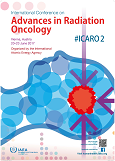Speaker
Takashi Nakano
(Department of Radiation Oncology, Gunma University Graduate School of Medicine)
Description
International cooperation of radiation oncology in RCA Asia
Takashi Nakano,MD, PhD
Professor, Radiation Oncology , Graduate School of Medicine, Gunma University
Director, Heavy Ion Medical Research Center, Gunma University
The International Atomic Energy Agency (IAEA) has objective of the contribution of atomic energy to peace, health and prosperity throughout the world. For the objective, the IAEA has promoted the effective use of radiotherapy for control cancer worldwide and especially in developing countries. In Asia-pacific region, the Regional Cooperative Agreement for Research, Development and Training Related to Nuclear Science and Technology for Asia and the Pacific (RCA) established to pursue the purpose which is an intergovernmental agreement in 1972. The membership has increased from its original 10 Member States to the present number of 22 Member States in the Asia-Pacific Region.
The RCA is an intergovernmental agreement in Asia-pacific region established in 1972 and the members of the RCA are 22 Member States in the region. The number of cancer patients in RCA Member States is growing rapidly and the disease has become a burden on national development. Bilateral and multi-lateral co-operation with international partners constitute an important part of the efforts by the regional countries / to develop and use their national capacity to solve cancer problems with nuclear based technology in national cancer control programs. The IAEA and the RCA play important roles in accelerating the development and application of nuclear techniques for cancer control and human welfare. IAEA/ RCA has implemented more than 30 regional projects in the fields of radiation oncology, nuclear medicine and medical physics since 1980’s, and 8 radiation oncology projects have been implemented since 2000. The themes of these radiation oncology projects were brachytherapy for cervical cancer, 3D image-based radiotherapy, 3D image-guided brachytherapy, stereotactic body radiation therapy, and intensity modulated radiotherapy. Japan and I have taken the role of Project Lead Country in 7 projects of these. The purpose of these project is to improve the knowledge and skill of radiation oncology professionals through regional training courses and expert mission for national training activities to disseminate the relevant technology and knowledge to national level.
Similar activities have been taken in FNCA activity of radiation oncology is also presented. FNCA is a Japan-led cooperation framework for peaceful use of nuclear technology in Asia. The cooperation consists of FNCA meetings and the project activities with the participation of Australia, Bangladesh, China, Indonesia, Kazakhstan, Korea, Malaysia, Mongolia, Philippines, Thailand and Vietnam. The 1st International Conference for Nuclear Cooperation in Asia (ICNCA) was held by the Atomic Energy Commission in March 1990 to promote cooperation in the field of nuclear energy with neighboring Asian countries more efficiently. In March 1999, it moved to a new framework, "Forum for Nuclear Cooperation in Asia" intending more effective and organized cooperation activities. Under this framework, view and information exchanges are made on the fields of Radiation Utilization Development (Industrial Utilization/ Environmental Utilization, and Healthcare Utilization), Research Reactor Utilization Development, Nuclear Safety Strengthening, and Nuclear Infrastructure Strengthening.
Under FNCA program, protocol study on standardized radiation therapy for uterine cervical cancer had been carried out since 1994. The objective of this joint clinical study is to contribute to the improvement of the radiation treatment techniques in eight Asian participant countries in accordance with the standard protocol. The standard protocol was established as the Standardized Radiotherapy Protocol for Treatment of Uterine Cervix Cancer (CERVIX-1) and its guidebook Radiation Therapy of Stage IIIB Cervical Cancer for Asians and report and guideline from the cooperative Trials was published in 2001. This guidebook is now actively used by Asian radiation oncologists and has been utilized in training courses of the IAEA to increase synergy of activities of FNCA and IAEA.
A clinical trial of the accelerated hyper-fractionation radiotherapy had been implemented among the FNCA countries since January 2000 in order to further improve the treatment outcome of cervical cancers. 103 patients with cervical cancers cases have been treated and the data showed increase in local control and survival as well as decrease of side effects of the surrounding normal tissues.
Two new cooperative studies started from the year 2003. One is chemo-radiotherapy (CRT) for cervical cancer and the other is CRT for nasopharyngeal cancer. In CRT for cervical cancer, superior results of survival was demonstrated in compared to CERVIX-1.
In RCA Asia, regional cooperation in terms of improvement of practice of radiation oncology as well as multi-institutional clinical research have been accelerating and expanding steadily.
| Country | JAPAN |
|---|
Author
Takashi Nakano
(Department of Radiation Oncology, Gunma University Graduate School of Medicine)

